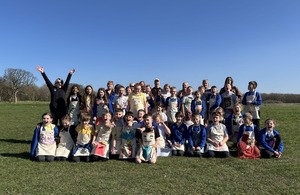School children in Stockton-on-Tees inspire nature recovery
The activity, centred around Tilery Park, encouraged engagement from residents and schools to understand how the local community view and use green spaces.

Children at Tilery Primary School unleash their inner plants and animals to help boost long-term, local nature recovery.
Children at Tilery Primary School have unleashed their inner plants and animals by putting on a wildlife parade to help boost long-term nature recovery in Teesside.
Delivered through the Tees Nature Recovery Partnership (NRP), the project, aims to encourage engagement from residents to understand how they use or don’t use Tilery Park and to explore barriers to access, plus community-led future aspirations for local green spaces.
The children in Year Five and Six designed animal costumes based on their interpretation of Tilery Park and worked with Teesside University and local artists to design what they would like their green space to look like in 100 years, to remind them about the importance of protecting habitats for local wildlife now.
They worked with photography, textiles and art materials, design and imagination to see, listen and explore Tilery Rec next door to the school. Local community groups also shared their memories and joined in with activities such as bingo and sculpture-making.
Pupils had the chance to show off their work as part of a green space parade which also formed part of their geography curriculum and highlights the school’s dedication to environmental issues.
The parade was filmed by Teesside University’s Sarah Perks and Paul Stewart (working together as Forms of Circulation). They were joined by local artists including Annie O’Donnell, Wil Jackson, Christo Wallers and Lizzie Mckeone for this project.

Children in Year Five and Six designed animal costumes based on their interpretation of Tilery Park
Emma Carter, a teacher at Tilery Primary School, said:
Our Year Five and Six children had a wonderful time learning about Tilery Rec and how it was used in the past, how it is used now and how they would like to see it being used in the future.
It has been great for our children to be out and about in our community. They are incredibly excited about the parade and are looking forward to seeing the photos taken for Natural England. Tilery Primary pupils have really benefitted from this project and are incredibly grateful for the opportunity to take part.
Vicky Ward, Natural England Senior Project Manager for the Tees Estuary Nature Recovery Partnership said:
It is fantastic to see young people’s creativity, passion and enthusiasm in helping to protect our natural habitats here in Teesside.
Good quality green and blue spaces have an important role to play in our urban and rural environments for improving health and wellbeing, nature recovery and climate resilience. Along with addressing issues of economic growth, social inequality and environmental decline.
This project has utilised imaginative approaches to explore how local children, and other residents, perceive and use Tilery Park and the surrounding green spaces. Being able to co-create meaning through the arts, enables residents to participate by sharing their hopes and aspirations on how their local green spaces can be used and valued.
Professor Sarah Perks and Dr Paul Stewart, from Teesside University’s Institute for Collective Place Leadership led the creative project and communities’ engagement for this project as part of their research in curatorial and artistic practice.
Professor Perks, Professor of Curating in the University’s School of Arts & Creative Industries said:
We are dedicated to engaging communities with local nature and connecting with living ecosystems, as part of our work as curators and academics.
Dr Paul Stewart, Principal Lecturer in Research and Innovation in the University’s School of Arts and Creative Industries, added:
We felt inspired by the multiple ways the schoolchildren involved in the project worked collaboratively.
The Tees NRP started in January 2023 and covers an area of 17,200 hectares where Natural England and the Environment Agency, Hartlepool Borough Council, Groundwork NE&C, National Trust, Redcar and Cleveland Borough Council, RSPB Saltholme, Stockton Borough Council, Teesmouth Field Centre, Tees Rivers Trust, Tees Valley Nature Partnership and Tees Valley Wildlife Trust are developing projects that will deliver nature recovery on the ground as well as improve people’s access and connection to local spaces.
The aim is to create a place which is greener, cleaner and climate resilient, where nature growth is prioritised, cultural heritage is celebrated, and everyone has easy and accessible ways to connect to nature for now and always.